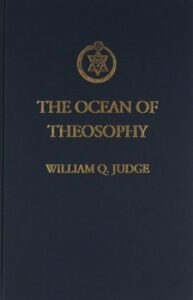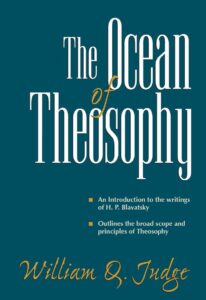Studies In The Ocean of Theosophy Part X
Theosophy Magazine
Vol. 21, No. 10 August 1933
pages 456 - 459
IN chapter six, Mr. Judge presents the mysterious subject of Kama, in Sanscrit, calling it by “the English equivalent — passions and desires — because these terms exactly express its nature.” Strangely enough, to Western ears, sounds the statement that passions and desires constitute Man’s fourth Principle. Even when convinced of the fact, its serious study presents many subtleties and is, perhaps, beset with obstacles. For a principle is a basis for action, really an instrument or body, in this connection; and while the application of this definition to physical body, astral form and even the Life-Principle, seems comprehensible, the idea of passion and desire having substantiality or as being anything in themselves at once meets with ingrained preconception to the contrary. In general, there prevails some vague idealism as to a Soul, possessed of good feelings, and of a body, standing accused as author of appetites and evil desires. Together with these is a modicum of moralizing about the mind’s necessity of making choice between the two, although preponderatingly prone to favor the wiles of the physical frame. Outside of Theosophy, complete obscuration obtains regarding what passions and desire may be. Positive investigation of the subject is militated against by the indefinite teachings of Science and Religion; and “no help is to be had in this matter from western psychology, now in its infancy and wholly devoid of knowledge about the inner, which is the psychical, nature of man.”
Thus has “the flesh” long served the Westerner as scapegoat for all his iniquities. But Theosophy shows the trouble to lie far deeper and that “passions and desires are not produced by the body, but, on the contrary, the body is caused by the former. It is desire and passion which caused us to be born, and will bring us to birth again and again in this body or in some other.” These form “a principle in themselves,” inclusive of all desires, best and worst alike. “It is by passion and desire we are made to evolve through the mansions of death called lives on earth”, either the holy passion to fulfill evolutionary duty or desire for earthly experiences, thirst for sensation. If it be the latter, then, indeed, is that incarnation a mansion of death; but if the former a Mansion of Life. In both cases, the basis for action is provided by the fourth, or Kamic, Principle.
Obviously, “influences” do play upon the mind, clamoring for choice in diametrically opposite directions, and can be coped with only by clear comprehension. Right knowledge of causes is the first step towards obviating evil effects. Once passion and desire are understood, both as material base and impelling force, thralldom to them can be replaced by control and direction to high purposes. God, devil, heaven, and hell reside within, in the psychical department of the human constitution. Choice of these is made by the use for which it is employed. Because of its two aspects — one tending toward Divinity, the other gravitating toward fiendishness — Kama is also called “the balance principle”. Pivot of the seven sheaths, it “stands in the middle,” both numerically and ethically. From it, “the ways go up or down.”
Pure philosophy holds nothing as “bad” or “good” in itself; so these terms, commonly applied to passion and desire, call for analysis. In the presentation of this subject, the words “low” and “high” are given preference, as follows: “The low is that shown by the constant placing of the consciousness entirely below in the body and the astral body; the high comes from the influence of and aspiration to the trinity above, of Mind, Buddhi, and Spirit.” Hence low desires are bad because not conducive to realization of inherent God-hood and the spiritualization of the material form, the victim so long held culprit for misdemeanors. The good includes all that furthers the lofty ideals of evolution — fostered, or retarded, according to the quality of daily living.
Man’s is the power of choice; but, paradoxically, he has no choice save to exercise it. To refrain from action involves choice, just as does an act; inaction in a given direction amounts to action in opposition; and always passion and desire “is the basis of action and the mover of the will.” Neither action nor inaction would be possible without it. The only mastery is in respect to which aspect shall be chosen. Not even the highest Being is exempt from choice and responsibility; but right choice can become so firmly established as to render the Chooser incapable of mistake. There can also be confirmation in wrong choice; but the Law of Economy, innate, forbids its permanency. The constructive forces of life must eventually prevail sweeping all obstructions before them.
The Elder Brothers of Humanity are possessed of unsullied discrimination, attained by unalloyed desire for the welfare of Man and Nature so sustained and deep as to draw all lesser desires into its current, even as a mighty river gathers the waters of its tributaries. Yet these Compassionators can look back through the vastnesses of time to a moment when They first deviated from the common level by definite choice for Truth and righteousness. “Even a Buddha or a Jesus had first to make a vow, which is a desire, in some life, that he would save the world or some part of it, and to persevere with the desire alive in his heart through countless lives.”
The presently bad man is one who “life after life took unto himself low, selfish, wicked desires, thus debasing instead of purifying this principle.” Continuance in this course spells “loss of all.” Yet there glimmers more hope for such than for a chronic waverer aligned with nothing, clogging the currents of progress like a foreign substance in the blood-stream. Reactions from distinctly wrong action may jolt the transgressor into better ways. Even with unqualifiedly wrong motives, grim Karmic results might teach of more intelligent self-interest, or even perchance, awaken something higher. But Nature herself repudiates the lukewarm, spewing him out of her mouth.
“On the material and scientific side of occultism — the use of the inner hidden powers of our nature — if this principle of desire be not strong, the master power of imagination cannot do its work, because though it makes a mould or matrix the will cannot act unless it is moved, directed, and kept up to pitch by desire.” All accomplishment, individual, or universal, requires this keeping “up to pitch.” It was by the arising of desire in the unknown first cause, the one absolute existence, that the whole collection of worlds was manifested, and by means of the influence of desire in the now manifested world is the latter kept in existence. An inspiring thought: that the continued existence of our own world is due to the desire and will of Beings grown great in wisdom and compassion through choice unswervingly “kept up to pitch” for Brotherhood.
Confirmation in choice — right or wrong — is impossible without apprehension of these alternatives. A seemingly criminal life would be but the natural result for one unaware of virtue, and little credit could redound to virtue ignorant of vice. Buddha demanded knowledge of the facts of human existence and freedom to choose. Much the same idea is suggested in the illustration used of the Sign Libra, representing the fourth Principle. Libra marks the zero point in the sun’s path through the Zodiac. The upward arc of his sidereal cycle can not be accomplished without passing through it. So it is said: “when the Sun (who is the real man) reaches that sign he trembles in the balance. Should he go back the worlds would be destroyed; he goes onward, and the whole human race is lifted up to perfection.”
Each incarnation has its Signs, “Libra,” where Man — the Sun-Being — “trembles in the balance”. Every choice for its higher aspect adds increment for future cycles, bringing less trembling, clearer vision, surer choice and better defined purpose, as well as being arrived at earlier in life — at length, even in youth when Kama is in full flower. Choice in opposite series leads to increasing identification with each new personality, accompanied by intenser play of destructive forces. In the cyclic history of individuals and nations, there eventually comes an ultimate moment when the Sign Libra, save in its higher aspect, must be permanently transcended — or not. Thence, the Chooser “goes on” in ever increasing power to lift the race “up to perfection”; or goes back, suffering the destruction of his worlds.
Motive determines the quality of all choice, but faulty discrimination can induce honest choice in wrong direction. Herein, lies the deadly injury wrought by priestcraft, cult, and pseudo-occultism, all of which, while confusing the mind, subsist by the sacrifices of the deluded. For without exception do these owe their continued existence to the devotion of their adherents kept “up to pitch” by the few grains of truth appropriated from the Ancient immemorial Wisdom-Teaching.
COMPILER’S NOTE: The following is a separate item which followed the above article but was on the same page. I felt it was useful to include it here:
THE SOURCE OF DREAMS
Question — How can we know whether dream is from the higher nature or the Kamic?
Answer —By knowing the nature of the inner man. When that knowledge is applied to the dream, its nature discloses itself and there is no question as to whether the dream is from the astral plane or from the higher nature. As a rule, all that we experience of a dream from the inner man is a feeling, for the dream being strained through the brain is all broken and confused. A dream that makes a profound impression, of course, can not be a mere surface dream.
Back to Ocean of Theosophy



